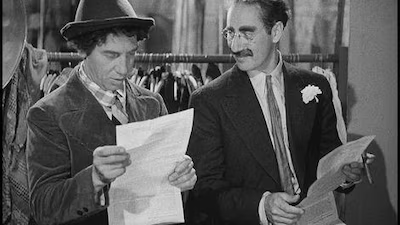Chico Marx

About
Biography
Filmography
Family & Companions
Notes
Age variously given as 70, 75 and 76 at time of death.
"His parody of an Italian offended no one because despite the farcical amorality of his activities, the character came through as an essentially kind and sweet person"--NEW YORK TIMES obituary, October 12, 1961
Biography
Chico (variously pronounced as "Cheek-o" and "Chik-o") was the dumb but wisecracking, piano-playing Marx Brother, whose character protected the innocent Harpo while flummoxing the all-knowing Groucho. Wearing a dark curly wig, a pointed hat and a goofy grin, he portrayed an Italian stereotype common in early 20th-century vaudeville which would later be deemed offensive. The eldest of the brothers, Chico (supposedly nicknamed for his success with "chicks") started his career with brother Harpo, after teenaged jobs as a pianist and wrestler. Such acts as "Fun in Hi Skool" (1911) and ""Home Again" (1914), helped the brothers hone their stage personalities: notably the smart-mouthed con-man (Groucho), the dumb Italian (Chico) and the mute faun (Harpo).
The four older brothers first gained national attention in the zany revue "I'll Say She Is" (1923-1925). Their long running hit "The Cocoanuts" (1925-1928), with book by George S. Kaufman and score by Irving Berlin, assured their stardom. (By this time, Gummo had left the act and was replaced by Zeppo). During the run of "The Cocoanuts," they made an independently-financed silent comedy, "Humorisk," which was never released and has been lost. On the strength of their next Broadway hit, "Animal Crackers" (1928-29), the team was signed to a five-picture contract by Paramount, which was scouting talent for its new sound studio in Astoria, Queens. Although the limitations of early film technology forced the Marxes to subdue their energetic comedy style and penchant for improvisation, the movie public flocked to "The Cocoanuts" (1929) and "Animal Crackers" (1930).
The Marx Brothers' last three Paramount releases, "Monkey Business" (1931), "Horsefeathers" (1932) and "Duck Soup" (1933), were box office disappointments, although they are now regarded as the team's most inspired comedies. The writing of George S. Kaufman and Morrie Ryskind was replaced by that of another brilliant humorist, S.J. Perelman and the films were directed by better comedy-handlers like Norman Z. McLeod and Leo McCarey. The Paramount vehicles de-emphasized typical Hollywood storylines and romantic subplots and simply providing screen space for the Marx Brothers to perform their routines. In the nearly plotless "Monkey Business," they are shipboard stowaways who wreak havoc on a luxury liner, while in "Horsefeathers," they participate in a free-form romp through a college campus. "Duck Soup," usually considered the team's absurdist masterpiece, is a satire on the politics of war, as the brothers run the country Freedonia into the ground.
The financially-troubled Paramount released the Marx Brothers following "Duck Soup," but the team (now minus Zeppo) was picked up by Metro-Goldwyn-Mayer at the behest of production chief Irving Thalberg who recast the usually irrepressible trio into the MGM mold. Re-inserting the usual Hollywood storylines, Thalberg set the brothers up as more sympathetic figures and offered romantic sub-plots and musical numbers to appeal to a broader audience. To these elements were added higher production values and the return of Kaufman and Ryskind. The two Thalberg films, "A Night at the Opera" (1935) and "A Day at the Races" (1937), revived their popularity (though many fans find these films a dull let-down from the zany Paramount comedies). But the death of Thalberg marked the end of the well-crafted Marx films. After a quick loan-out to RKO (for the substandard "Room Service" in 1938), the aging team did three flat comedies at MGM. After the war, the reunited for the undistinguished "A Night in Casablanca" (1946) and "Love Happy" (1949). They last appeared in the same film--though separately--in Irwin Allen's all-star flop "The Story of Mankind" (1957).
Chico never made a film without his brothers, but he did appear on TV as early as 1949, with such shows as "Silver Theater," "College Bowl" and "The Bigelow Theater." Shortly before his death, he and Harpo filmed a TV pilot about two angels, but Chico's declining health and the show's poor writing doomed it from the start. He led his own orchestra, "Chico Marx and His Ravellis" in the 1940s, tried his hand as a restaurateur in 1946, appeared with Harpo at the London Palladium in 1949 and toured with the show "The Fifth Season" in 1956. Heart disease kept Chico pretty much out of the limelight for several years before his death in 1961. He took less interest in his career than did Groucho and Harpo. A good-natured gambler and womanizer, Chico Marx worked more for the money than the glory. According to Harpo, he was also the team's unofficial agent.
Filmography
Cast (Feature Film)
Cast (Short)
Misc. Crew (Short)
Life Events
1920
Toured Keith-Albee vaudeville circuit with brothers
1923
Broadway debut, in "I'll Say She Is"
1929
Film debut in "The Cocoanuts"
1940
Worked as bandleader during WWII
1944
Acted in revue "Take a Bow"
1946
Opened chain of Los Angeles restaurants
1948
Made TV debut, without brothers
1949
Played London Palladium with Harpo
1956
Final stage appearance, "The Fifth Season"
1957
Final film, "The Story of Mankind"
Photo Collections
Videos
Movie Clip












Trailer










Family
Companions

Bibliography
Notes
Age variously given as 70, 75 and 76 at time of death.
"His parody of an Italian offended no one because despite the farcical amorality of his activities, the character came through as an essentially kind and sweet person"--NEW YORK TIMES obituary, October 12, 1961
"All his life Chico has had an uncanny talent for turning up prospects. It was he who first put us on Broadway, and made us internationally famous. It was Chico who turned up the producer--Irving Thalberg--who put us into Grade-A movies."--Harpo Marx quoted in THE NEW YORK TIMES, October 12, 1961











